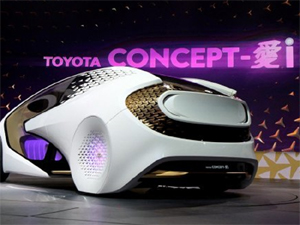



Date:10/01/17
 Toyota unveiled its Concept-i vehicle today at CES, and in case you weren’t sure, this is about as concept-y as concept vehicles get. The futuristic design and aerodynamic shape just screams science fiction. And to top it off, Toyota says the car has built-in artificial intelligence, nicknamed “Yui,” designed to “learn from and grow with the driver.”
Toyota unveiled its Concept-i vehicle today at CES, and in case you weren’t sure, this is about as concept-y as concept vehicles get. The futuristic design and aerodynamic shape just screams science fiction. And to top it off, Toyota says the car has built-in artificial intelligence, nicknamed “Yui,” designed to “learn from and grow with the driver.”
“The interface begins with the visual representation of Yui, designed to communicate across cultures to a global audience,” Toyota says. “With Yui’s home centered on the dashboard, Concept-i’s interior emanates around the driver and passenger side and throughout the vehicle in sweeping lines, with interior shapes designed to enhance Yui’s ability to use light, sound and even touch to communicate critical information.”
So what will Yui, and the Concept-i, mean for the future of vehicle ownership and driving? Toyota says the vehicle is about making driving a more “warm and friendly” experience. It’s part of a broader trend in the automotive world to turn the inside of your car into a so-called “third space,” a place where we will spend the majority of our time outside of home and the office.
Think of Yui as Siri or Alexa in the car, but embedded into the vehicle’s architecture. The artificial intelligence that’s powering Yui will also communicate to the world when the Concept-i is engaged in autonomous driving.
Yui appears on exterior door panels to greet driver and passengers as they approach the vehicle. The rear of the vehicle shows messages to communicate about upcoming turns or warn about a potential hazard. The front of the vehicle communicates whether the Concept-i is in automated or manual drive.
And the headlights... they blink. I can’t stress how adorable this car is. It’s like an oversized, mobile Tamagotchi. Just remember to keep you Concept-i fed and happy.
Toyota’s Concept-i has built-in artificial intelligence named ‘Yui’
 Toyota unveiled its Concept-i vehicle today at CES, and in case you weren’t sure, this is about as concept-y as concept vehicles get. The futuristic design and aerodynamic shape just screams science fiction. And to top it off, Toyota says the car has built-in artificial intelligence, nicknamed “Yui,” designed to “learn from and grow with the driver.”
Toyota unveiled its Concept-i vehicle today at CES, and in case you weren’t sure, this is about as concept-y as concept vehicles get. The futuristic design and aerodynamic shape just screams science fiction. And to top it off, Toyota says the car has built-in artificial intelligence, nicknamed “Yui,” designed to “learn from and grow with the driver.”“The interface begins with the visual representation of Yui, designed to communicate across cultures to a global audience,” Toyota says. “With Yui’s home centered on the dashboard, Concept-i’s interior emanates around the driver and passenger side and throughout the vehicle in sweeping lines, with interior shapes designed to enhance Yui’s ability to use light, sound and even touch to communicate critical information.”
So what will Yui, and the Concept-i, mean for the future of vehicle ownership and driving? Toyota says the vehicle is about making driving a more “warm and friendly” experience. It’s part of a broader trend in the automotive world to turn the inside of your car into a so-called “third space,” a place where we will spend the majority of our time outside of home and the office.
Think of Yui as Siri or Alexa in the car, but embedded into the vehicle’s architecture. The artificial intelligence that’s powering Yui will also communicate to the world when the Concept-i is engaged in autonomous driving.
Yui appears on exterior door panels to greet driver and passengers as they approach the vehicle. The rear of the vehicle shows messages to communicate about upcoming turns or warn about a potential hazard. The front of the vehicle communicates whether the Concept-i is in automated or manual drive.
And the headlights... they blink. I can’t stress how adorable this car is. It’s like an oversized, mobile Tamagotchi. Just remember to keep you Concept-i fed and happy.
Views: 467
©ictnews.az. All rights reserved.Similar news
- Justin Timberlake takes stake in Facebook rival MySpace
- Wills and Kate to promote UK tech sector at Hollywood debate
- 35% of American Adults Own a Smartphone
- How does Azerbaijan use plastic cards?
- Imperial College London given £5.9m grant to research smart cities
- Search and Email Still the Most Popular Online Activities
- Nokia to ship Windows Phone in time for holiday sales
- Internet 'may be changing brains'
- Would-be iPhone buyers still face weeks-long waits
- Under pressure, China company scraps Steve Jobs doll
- Jobs was told anti-poaching idea "likely illegal"
- Angelic "Steve Jobs" loves Android in Taiwan TV ad
- Kinect for Windows gesture sensor launched by Microsoft
- Kindle-wielding Amazon dips toes into physical world
- Video game sales fall ahead of PlayStation Vita launch





















